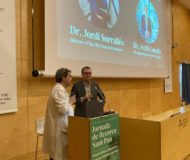

Today, we celebrated the Sant Pau Research Day with genomics and rare diseases taking center stage. The day began with an introduction by Dr. Xavier Prats Monné, president of the board of the Sant Pau Research Institute (IR Sant Pau), who highlighted the talent and excellent work carried out by professionals in this field at Sant Pau.
The overarching theme of this day revolved around the Transversal Program of Genomics and Rare Diseases, emphasizing significant technological and bioinformatic advancements in genomics. These advances have not only positively impacted the diagnosis of rare genetic diseases but have also contributed to identifying risk factors, prognosis, and treatment of more common pathologies.
Dr. Jordi Surrallés, director of IR Sant Pau, took the floor to explain the ongoing actions within the framework of the 2019-2024 strategic plan. In this context, he dedicated heartfelt words to Dr. Josep Torrent Farnell, recently departed, highlighting his contribution as an attending physician at Sant Pau Hospital and as an international reference in the field of rare diseases.
Various experts participated with presentations on relevant topics. Dr. Roser Torra, from the Nephrology research group at IR Sant Pau – Puigvert Foundation, highlighted the use of artificial intelligence for diagnosing hereditary kidney diseases. Also, Dr. Elena Muiño, a “Joan Rodes” researcher in the Pharmacogenomics and Neurovascular Genetics group, spoke about CADASIL, a rare cerebral vascular disease.
Dr. Montse Campmany, head of the Knowledge Management Unit at IR Sant Pau, explained that one of the main objectives of this unit is to enhance excellence in the management of institutional scientific information, complying with established regulations, to contribute to the development of biomedical research and the improvement of health and society’s well-being.
Dr. Leif Hove-Madsen, head of the Rhythm Regulation and Cardiac Contraction group at IR, discussed single nucleotide polymorphisms for personalized treatment of atrial fibrillation. Pharmacogenetics was the focus of Dr. Pau Riera’s intervention, a “Joan Rodes” researcher in the Genetic Diseases group.
On the other hand, Dr. Eduard Gallardo, a researcher in the neuromuscular diseases group and head of the CIBERER group, explained translational research applied to neuromuscular disease, myasthenia gravis.
Dr. Sandra Camino, head of the Genomics and Transcriptomics Platform at IR Sant Pau, spoke about the support they offer to the scientific community, both with specific equipment and genomic techniques.
Dr. Surrallés, this time as head of the DNA Repair Syndromes and Predisposition to Cancer group, explained the importance of genes in the therapies for Fanconi Anemia, a cancer predisposition syndrome.
Dr. Maria Sabater, a “Miguel Servet” researcher in the Complex Diseases Genomics group, highlighted the role of genomic medicine in vascular diseases. Dr. Anna Aulinas, a “Joan Rodés” researcher in the Pituitary Diseases research group, talked about the contribution to improving the diagnosis and treatment of patients with pituitary diseases.
Dr. Israel Fernández-Cadenas, head of the Pharmacogenomics group, explained how genetic studies can help find treatments for complex diseases.
The closing talk was given by Dr. Ángel Carracedo, director of the Galician Public Foundation of Genomic Medicine and President of the External Scientific Committee of IR Sant Pau, who emphasized the importance of personalized medicine and genomics. He also explained the need for biomarkers to stratify and thus achieve effectiveness in rare diseases.
The director of IR, Dr. Surrallés, and the director of Sant Pau Hospital, Dr. Adrià Comella, concluded the event by emphasizing the importance of joint work and coordination between the Research Institute and the Hospital to ensure quality healthcare for all.
During the Day, the exhibition “Research on Rare Diseases, in Photos” was also presented. It consists of a selection of photographs with which CIBERER researchers participated in the rare diseases photography contests in 2021 and 2022.